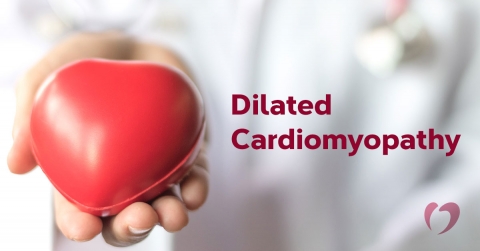Dilated Cardiomyopathy

Dilated cardiomyopathy (DCM) is a condition in which the chambers of the heart enlarge, or dilate. The main pumping chamber, the left ventricle, is often the first affected. As the chamber enlarges, its walls stretch, which causes them to become thinner and weaker. The problem eventually spreads to the other chambers of the heart, from the right ventricle to the atria.
A heart weakened by DCM struggles to pump blood effectively, which results in insufficient blood flow to the body. Blood pooling in the heart and lungs can lead to serious complications such as clots, strokes, and heart attacks.
Causes and risk factors
While the exact cause of DCM is sometimes unknown, various diseases, conditions, and risk factors can contribute to its development. These include infections and viruses that inflame the heart muscle, substance abuse, or the last several months of pregnancy.
Risk factors for DCM include:
- Family history of dilated cardiomyopathy or coronary heart disease
- Previous heart damage
- Valve disease
- Inflammatory immune system diseases
- Excessive alcohol use or drug use
- High blood pressure
Symptoms
Dilated cardiomyopathy symptoms can vary from person to person. As the disease progresses, symptoms often worsen. The most common symptoms include:
- Shortness of breath that progresses from exertion-based to occurring at rest
- Shortness of breath while lying down or that awakens you at night
- Fatigue
- Reduced ability to be active
- Swelling in the extremities
- Fainting
- Cough
- Arrhythmia
Treatment
Treatment for dilated cardiomyopathy aims to prevent further damage, improve blood flow, and relieve symptoms. Recommended treatment will depend on the underlying cause of the cardiomyopathy, but much of the standard treatment follows the treatment for heart failure. This includes various medications to lower blood pressure and improve heart function for less severe cases and surgery and implantable devices for more severe cases.
Common medications used include:
- Angiotensin-converting enzyme (ACE) inhibitors
- Angiotensin II receptor blockers (ARBs)
- Beta-blockers
- Mineralocorticoid receptor antagonists (MRA)
- SGLT2 inhibitors
- Diuretics
- Anticoagulants (blood thinners)
When devices are needed, an implantable cardioverter defibrillator (ICD) or left ventricular assist device (LVAD) can be placed. ICDs control arrhythmias by using electricity to stimulate the heart when necessary. An LVAD is a type of pump that assists the heart in pumping enough blood to the rest of the body.
For more information on DCM, including risk factors, symptoms, and treatment options, reach out to the experts at OHH.




